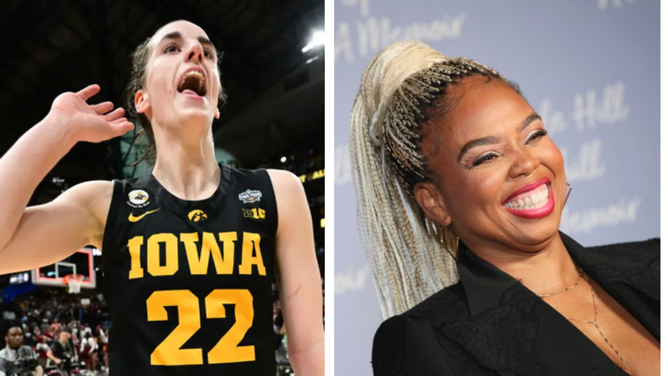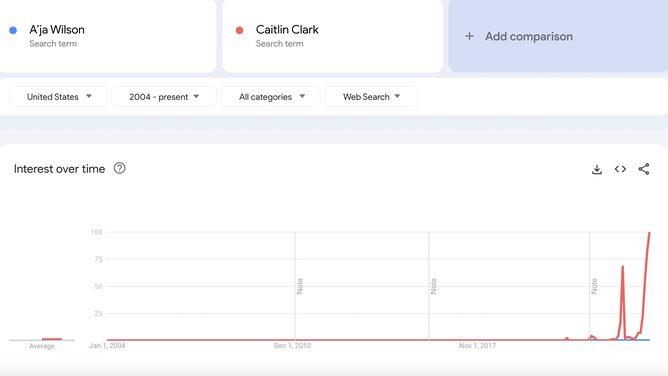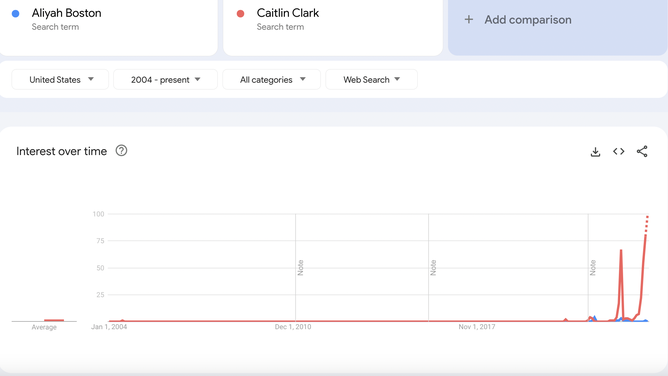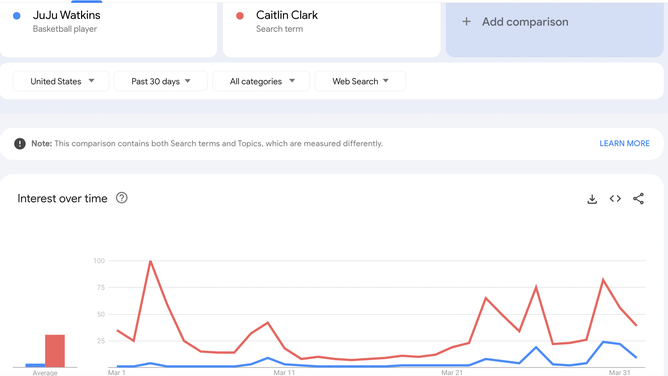Jemele Hill Complains Caitlin Clark Receives More Coverage Than Black Players
Caitlin Clark is the best player in women's college basketball. She's the biggest television draw in the sport, by far. She's also white. And that latter point is the one to which Jemele Hill most attributes Clark's stardom.
Hill participated in an interview with Uproxx over the weekend where she said while she appreciates Clark's contributions to the game, she thinks Clark receives more credit than she deserves for the growth of women's basketball.
"Everything about this sport has been trending up for years now. It did not just start with Caitlin Clark," Hill said.
Specifically, Hill blames the media for covering Clark more than double the rate it covers women of color.
Hill cited A’ja Wilson, a black woman who played for South Carolina from 2014 to 2018:
"A study I cited recently for a piece I wrote in The Atlantic [found that] when you compare [the coverage] of, say, someone like (Paige) Bueckers, Sabrina Ionescu, or Caitlin Clark to A’ja Wilson, who has dominated basketball at every single level. She’s probably the best player in the world right now. And I’m not trying to act like she gets no coverage, but the coverage that sometimes non-white women get, or specifically Black women get, is not even close. It’s two-to-one."
And then Aliyah Boston, a black woman who played for South Carolina from 2019 to 2023:
"I mean, Aliyah Boston was the best player in college just a couple of years ago. And she did not get even a 10th of this media coverage that Caitlin Clark did. Now, some people would say, "Oh, it’s her game." But I don’t think it was that. She’s tremendous on television, and I’m thinking, What a missed opportunity for the national media to really elevate who she was as a person. Caitlin Clark seems to be a great personality, but it is not like Caitlin Clark is walking around saying crazy stuff. They’re just covering her excellence, and that’s good enough. Whereas it feels like for Black athletes to get the same amount of coverage or even fair coverage, there has to be something extra [beyond basketball]."

Jemele Hill's point – that Caitlin Clark is more of a star because she's white – is not exactly a novel take. USA Today posted an article with a similar thesis last month, arguing that "Women's basketball needs faces of the future to be black."
The article credited black women for building the sport of women's basketball – a factual lie – and thus declaring it their sport in which they should star.
Not white women.
Clark is frequently the subject of blatant racial animus, be it from Hill, USA Today, Sheryl Swoopes or Gilbert Arenas.
However, Clark's skin color has little to do with the media coverage she receives. Simply put, the media covers players who garner clicks, viewership and listeners.
Caitlin Clark does that. She moves the needle. Other women in basketball, including both college and pro, do not.
"The Caitlin Clark business is booming," The Athletic found last month. Broadcast networks cater to her because she sets viewership records. Ticket sales for her games are in unprecedented demand for women's hoops. Internet articles about Clark rival those of LeBron James, per Google Trends.
Let us compare the interest of A’ja Wilson to Clark, based on Google searches:

And Aliyah Boston:

Or USA Today favorite JuJu Watkins out of USC:

The media coverage is so disproportionately in favor of Caitlin Clark because the level of interest in her is so disproportionately wider than any other woman in the sport, black or white.
Clark is a singular, transcendent star.
Those come around every few decades. And when they come around in sports other than the NFL or NBA – two sports with built-in national cachet -- it prompts uneven media focus.
Yet the common denominator in those cases is not white skin color, as Hill and others suggest.
Tiger Woods dwarfed the media coverage of other golfers. As did Floyd Mayweather in boxing. And Simone Biles in gymnastics. And Shohei Ohtani in baseball.
Caitlin Clark is to women's college basketball what those names were/are to their respective sports. The difference is that she's a white girl dominating a historically black sport. There's a wing of media pundits who reject her because of that.
There is virtually no proof that white players receive more coverage or are more popular because they are white. In fact, the most covered athletes today are black: Patrick Mahomes, Lamar Jackson, Dak Prescott, LeBron James, Steph Curry and Kevin Durant.
OutKick writer Glenn Guilbeau has long covered college sports, both men's and women's. He provided the following observation:
"If a black women’s player scored like Caitlin now, she would get as much attention as Caitlin, if not more. My goodness, Angel Reese was more famous than Caitlin at this time last year."
Caitlin Clark is better and more interesting than any other woman in the sport over the past few decades. That's it. That's the story.
Society is more color-blind than Jemele Hill and her cronies realize. Or wish to realize.
Anyway, Jemele asks that the "brigade of Caitlin Clark fans" leave her alone: